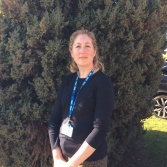
Helen Wiles - Electronic Assistive Technology Service (EATS)
I am a speech and language therapist working for the Electronic Assistive Technology Service (EATS) in Lincoln.
My initial interest in speech and language therapy came from observing my sister’s speech and language therapy sessions when she was a child and being inspired by the change they had on her communication.
Little did I know that more than 20 years later I would work alongside that same speech and language therapist and she would again inspire me to work in augmentative and alternative communication (AAC). She really has a lot to answer for!
My current job role within the EATS team is to provide specialist AAC services to patients across the East Midlands.
In real terms, this means supporting both children and adults with a range of physical and/or sensory difficulties to communicate to their fullest potential, using power-based solutions usually called communication aids.
While I now work with children and adults, my first experience in speech and language therapy and AAC was with children and it continues to be an area I love to work in.
Being able to support local speech and language therapists and share and develop their knowledge to enable them to deliver support to these complex children is rewarding. But often it is the smaller goals that enable a child to make choices, control their environment, gain independence, and develop socially that have the most impact on the children and their families and bring the most job satisfaction.
Having excessively talkative children myself, I love seeing a child’s personality come to life when provided with a communication aid. Receiving feedback that a patient has used their communication aid to tell others what is wrong rather than that frustration leading to challenging behaviour, or enabling a young adult to communicate their thoughts on the next steps in their lives such as college, make being a speech and language therapist worthwhile.
The difference working for EATS is the challenge of ever-changing technology and the continual game of catch up we play with our own professional development.
The varied job roles within the team including technologists (not usually a role present within a speech and language therapy team) provide alternative views and opportunities for learning with every patient, and also make every day interesting.
The variety and unpredictability within a role that allows you to support the most basic of human rights is the reason I enjoy the profession so much.
